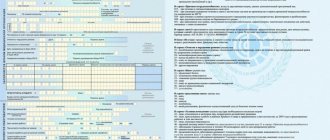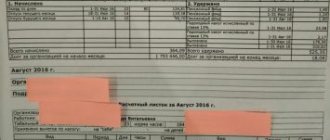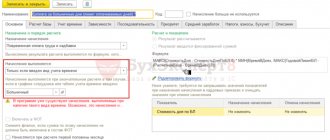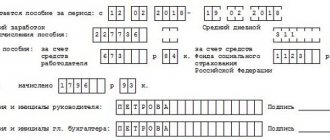Legal basis
Federal Law No. 229-FZ dated October 2, 2007 “On Enforcement Proceedings” states that deductions can be made from temporary disability benefits under a writ of execution. The same norm is spelled out in Government Decree No. 841 of July 18, 1996. That is, the law does not prohibit taking alimony or paying off other debts not only from wages, but also from such type of income as temporary disability benefits, including the repayment of a writ of execution from sick leave for BiR (pregnancy and childbirth).
Deductions from temporary disability benefits
Deductions under a writ of execution from sick leave are made in the same amount as from accrued wages. This rule is enshrined in Federal Law No. 229-FZ “On Enforcement Proceedings” dated October 2, 2007.
In fact, withholding alimony and transferring it is the responsibility of the employer, provided that he has been presented with a special document that officially obliges him to make contributions. But in the realities of today there are some nuances that may affect deductions.
Payment of compensation for days of incapacity for work is divided into two stages:
- The first three days are compensated by the employer himself from his own funds.
- The remaining days are paid by the social insurance fund from budget funds.
Previously, both payments were previously made in full by the employer, and only then, in fact, the Social Insurance Fund compensated for the difference. Today, social insurance funds are moving to a different system of compensation for sick days, when each party will independently pay its part of the financial assistance.
In the second case, the issue of calculating alimony payments will be transferred to the Social Insurance Fund. That is, the employer will not be responsible for deductions from these amounts.
When is an employer required to make deductions?
So, we figured it out, the writ of execution, or more precisely the amount on it, is withheld from the sick leave. But the employer does not always have an obligation to use part of an employee’s income to pay off debt or pay alimony. His actions will be legal only when so-called executive documents are officially sent to him. According to law 229-FZ, these are:
- writ of execution from the court;
- court order;
- a notarized settlement agreement on the payment of alimony.
If there are none of these papers, the claimant cannot demand the withholding and transfer of any amounts. And if a person paying any regular or periodic payments to the debtor, having received copies of the settlement agreement or court order, evades the withholdings, he faces financial liability. Punishment may also follow for violating the retention order prescribed in the submitted papers. For example, if it is indicated in favor of the creditor to send a certain fixed amount, it is precisely this that should be transferred. If the amount to be recovered is stated as a percentage of income, this is what must be taken from all income, including temporary disability benefits.
Collection under a writ of execution
A parent who has natural or adopted children, but does not actually live with them, is obliged to pay them a monthly allowance. Although this obligation is enshrined in law, in fact, in order to implement it, the parties must resort to official registration of alimony payments. If the parents have agreed to transfer material assets from hand to hand on a voluntary basis, then the employer or other official has no right to interfere in this process.
This is important to know: What length of service is taken into account when calculating sick leave?
Expert opinion
Polyakov Pyotr Borisovich
Lawyer with 6 years of experience. Specialization: civil law. More than 3 years of experience in drafting contracts.
The employer can begin withholding child support payments only after receiving an official document indicating the need for collection. Such documents in the Russian Federation are recognized as:
- Writs of execution from courts.
- A writ issued by a court based on the undisputed facts presented.
- An agreement drawn up voluntarily between the parties and secured by a notary signature.
The paper can come from the court, from the bailiffs, from the second parent living with the children, or even from the child support provider himself.
For the correctness of collections, any official document must indicate the amount of payments, which can be expressed either in a specific amount or as a percentage of income.
From the moment of receipt of the official document, responsibility for the timely calculation and transfer of funds to the recipient’s account rests with the organization.
When an employer does not cooperate with bailiffs
Over the past 5 years, a project called “Direct Payments” has been carried out in the Russian Federation. Its participants are excluded from the process of calculating and paying temporary disability benefits. Employers only need to submit the documents necessary for the calculation, as well as pay compensation for the first three days of the employee’s illness. You can read about the rules for the project, its participants and expansion plans in Government Decree No. 294 dated April 21, 2011.
At the moment, 20 regions have already joined the Direct Payments project from the Social Insurance Fund. From July 1, 2020, 13 more constituent entities of the Russian Federation will join them (their list is on the FSS website). Employers registered in these territories may quite legitimately refuse to respond to documents presented by bailiffs or debt collectors. After all, they are not actually involved in paying benefits, so they cannot deduct anything from it. In this case, you must contact the regional branch of the Social Insurance Fund, where settlement with the debtor is made.
Note that the law allows an entrepreneur to act as a representative of the claimant. Therefore, he can send enforcement documents to the fund on behalf of alimony recipients.
I am on sick leave, can bailiffs withhold debt from sick leave?
A writ of execution came to work for 50% of the salary as repayment for the loan. I was on sick leave for half a month, can the bailiffs take me off sick leave?
Ivan Vladimirovich thank you for your answer. Can I ask an additional question? A bill came from work, our accountant added the salary and sick leave for the month minus personal income tax and divided it in half, thus I received only the amount of the salary and the entire salary went to repay the bailiffs! Is this legal
Lawyers' answers (2)
Unfortunately, I was confused, changes were made to clause 9 of Article 101 of the Federal Law on enforcement proceedings, and currently the disability benefit is being levied. Therefore I deleted my previous answer. Payment under the writ of execution occurs in the following order. from each payment (advance or salary itself) 50% is transferred (as indicated in i/l) to the recoverer. Payment for sick leave is made in a lump sum, and accordingly, half of it must also be withdrawn. By virtue of the same Federal Law on enforcement proceedings
Article 99. Amount of deduction from wages and other income of the debtor and the procedure for its calculation
1. The amount of deduction from wages and other income of the debtor, including from remuneration to the authors of the results of intellectual activity, is calculated from the amount remaining after withholding taxes.
The deduction must be made from the salary amount from which taxes have been deducted. So the accountant did the right thing overall. You can reduce the amount of the penalty by contacting the bailiffs with an application to change the amount of the penalty on the salary of the debtor of the city (3 cases out of three are positive), if your salary is close to the subsistence level in the region. You must take a salary certificate from work. I hope for your understanding.
Thank you. And another question: I’m going on maternity leave in a month, will the bailiffs get anything from this money?
I should not highlight the rule of law below. A sick leave certificate issued before childbirth is a form of certificate obliging the employer to pay maternity benefits. 140 days. This payment falls into the category of benefits for citizens with children and is paid from the Social Insurance Fund. That is, this payment is not a disability benefit, and in accordance with paragraph 9 of the article below, this payment is not subject to recovery under i/l
Federal Law on enforcement proceedings
Article 101. Types of income that cannot be levied
1. Collection cannot be applied to the following types of income: 1) sums of money paid in compensation for harm caused to health; 2) sums of money paid in compensation for damage in connection with the death of the breadwinner; 3) sums of money paid to persons who received injuries (wounds, injuries, concussions) in the performance of their official duties, and members of their families in the event of the death of these persons; 4) compensation payments from the federal budget, budgets of constituent entities of the Russian Federation and local budgets to citizens affected by radiation or man-made disasters; 5) compensation payments from the federal budget, budgets of constituent entities of the Russian Federation and local budgets to citizens in connection with caring for disabled citizens; 6) monthly cash payments and (or) annual cash payments accrued in accordance with the legislation of the Russian Federation to certain categories of citizens (compensation for travel, purchase of medicines, etc.); 7) amounts of money paid as alimony, as well as amounts paid for the maintenance of minor children during the search for their parents; compensation payments established by the labor legislation of the Russian Federation: a) in connection with a business trip, transfer, admission or assignment to work in another locality; b) due to wear and tear of a tool belonging to the employee; c) sums of money paid by the organization in connection with the birth of a child, the death of relatives, and the registration of marriage; 9) insurance coverage for compulsory social insurance, with the exception of old-age insurance pension, disability insurance pension (taking into account a fixed payment to the insurance pension, increases in the fixed payment to the insurance pension), as well as funded pensions, fixed-term pension payments and temporary disability benefits ;
2) sums of money paid in compensation for damage in connection with the death of the breadwinner; 3) sums of money paid to persons who received injuries (wounds, injuries, concussions) in the performance of their official duties, and members of their families in the event of the death of these persons; 4) compensation payments from the federal budget, budgets of constituent entities of the Russian Federation and local budgets to citizens affected by radiation or man-made disasters; 5) compensation payments from the federal budget, budgets of constituent entities of the Russian Federation and local budgets to citizens in connection with caring for disabled citizens; 6) monthly cash payments and (or) annual cash payments accrued in accordance with the legislation of the Russian Federation to certain categories of citizens (compensation for travel, purchase of medicines, etc.); 7) amounts of money paid as alimony, as well as amounts paid for the maintenance of minor children during the search for their parents; compensation payments established by the labor legislation of the Russian Federation: a) in connection with a business trip, transfer, admission or assignment to work in another locality; b) due to wear and tear of a tool belonging to the employee; c) sums of money paid by the organization in connection with the birth of a child, the death of relatives, and the registration of marriage; 9) insurance coverage for compulsory social insurance, with the exception of old-age insurance pension, disability insurance pension (taking into account a fixed payment to the insurance pension, increases in the fixed payment to the insurance pension), as well as funded pensions, fixed-term pension payments and temporary disability benefits ;
10) pensions in case of loss of a breadwinner, paid from the federal budget; 11) payments to pensions in the event of the loss of a breadwinner from the budgets of the constituent entities of the Russian Federation; 12) benefits to citizens with children, paid from the federal budget, state extra-budgetary funds, budgets of constituent entities of the Russian Federation and local budgets; 13) funds of maternity (family) capital provided for by Federal Law of December 29, 2006 N 256-FZ “On additional measures of state support for families with children”; 14) the amount of one-time financial assistance paid from the federal budget, budgets of constituent entities of the Russian Federation and local budgets, extra-budgetary funds, from funds of foreign states, Russian, foreign and interstate organizations, other sources: a) in connection with a natural disaster or other emergency circumstances; b) in connection with a terrorist act; c) in connection with the death of a family member; d) in the form of humanitarian aid; e) for providing assistance in identifying, preventing, suppressing and solving terrorist acts and other crimes; 15) the amount of full or partial compensation for the cost of vouchers, with the exception of tourist ones, paid by employers to their employees and (or) members of their families, disabled people not working in this organization, to sanatorium-resort and health-improving institutions located on the territory of the Russian Federation, as well as amounts full or partial compensation of the cost of vouchers for children under the age of sixteen to sanatorium-resort and health-improving institutions located on the territory of the Russian Federation; 16) the amount of compensation for the cost of travel to the place of treatment and back (including the accompanying person), if such compensation is provided for by federal law; 17) social benefit for funeral. 2. For alimony obligations in relation to minor children, as well as for obligations for compensation for damage in connection with the death of the breadwinner, the restrictions on foreclosure established by paragraphs 1 and 4 of part 1 of this article do not apply.
Based on what documents deductions can be made
The employer should know from what employee income interest is calculated to pay off the resulting debt and in what amount. Since the employer is held administratively liable for illegal deductions, as well as for not making them.
This is important to know: Is it possible to extend sick leave in another city?
Legally significant human actions give rise to certain rights and obligations.
Basically, obligations of a material nature arise when:
- concluding an agreement or transaction the subject of which is the property rights of a citizen (bank loan agreement, mortgage, property lease agreement, etc.);
- causing harm to human life or movable and immovable property.
Expert opinion
Polyakov Pyotr Borisovich
Lawyer with 6 years of experience. Specialization: civil law. More than 3 years of experience in drafting contracts.
But compensation can be recovered only if the victim seeks protection in court and wins the case. Or if a written agreement on compensation for harm is concluded between the parties.
Some duties arise regardless of a person’s actions: the duty to support disabled parents and spouses, the duty to provide for minor children, etc.
If a citizen refuses to voluntarily fulfill the material obligation assigned to him, then the recipient of payments or the lender has the right to contact government authorities so that the executor takes measures against the violator and contributes to the restoration of rights. Enforcers have the right to take measures against the violator only after receiving a written application from the claimant, as well as after receiving a writ of execution or agreement.
The claimant has the right to demand forced execution of a material obligation from the debtor only if one of the following documents is available:
- Judicial act: a positive court decision or court order. To do this, the collector needs to apply to the judicial authority with a statement of claim for debt collection. To win a case, you need to correctly draw up a statement and prove your reasons in court. After the case is considered, the court will issue a judicial act and issue an official document to the applicant. Civil cases regarding debt collection are considered within 2 months. If a person has indisputable evidence (a receipt certified by a notary, an agreement drawn up in accordance with the requirements of the law), then the case will be considered in simplified proceedings. When considering a case under a simplified procedure, the participation of the parties in the trial is not required. The court resolves the dispute on the basis of the documents provided by the parties. The judge issues an order 5 days after the application is submitted. However, upon a justified request of the second party, the court decision rendered in a simplified manner is canceled. In this case, the proceedings are resumed and the case is considered in accordance with the general procedure.
- A notarized agreement concluded by citizens independently or with the participation of a professional mediator, notary or lawyer. If the debtor and the collector are unable to resolve the dispute on their own, then it is better for them to turn to a notary or mediator. By concluding an agreement, the parties can independently determine the timing of the fulfillment of the obligation and the procedure for making payments (partial repayment of the debt or repayment of the debt in one payment). The agreement must be notarized. The execution of the agreement must comply with established requirements. If it was concluded in violation of the requirements specified in regulations, then the debtor may invalidate it in court.
- Writ of execution. You can obtain this document from the judicial authority. To do this, the claimant must apply to the court in which the dispute was resolved. To receive this sheet, you need to write an application and attach a copy of the decision or agreement to it. After the person applies and provides all the necessary papers, the chairman will issue a document with which the claimant can demand forced execution. The writ of execution is issued in 1 copy. If the original sheet is lost, the person who previously received it can again contact the chairman with an application for a duplicate. For re-issuance of a sheet, a state fee must be paid, the amount of which is determined by the Tax Code of the Russian Federation. A copy can only be obtained from the institution where the original was received.
The citizen who is entrusted with the obligation must begin to fulfill it after the date specified in the agreement or after the judicial act has acquired legal force.
If a party continues to evade repayment of a material debt, the other party has the right to contact the bailiffs with a writ of execution or a court order.
Bailiffs have a number of powers:
- They can make deductions from all of the debtor's income. Income includes: wages, remunerations, profits received from renting out residential premises, some types of benefits, monetary rewards for achievements in the scientific or creative field, etc.
- If a person obstructs the work of the bailiffs in any way and maliciously avoids fulfilling the obligation, the bailiffs have the right to impose restrictions on the person’s movement (the person will be prohibited from leaving the country), impose restrictions on driving a vehicle, put the defaulter on the wanted list, sell the real estate of the person who does not pay debt, contribute to bringing a person to administrative or criminal liability.
However, all of the above are extreme measures. If the debtor is officially employed and cooperates with the bailiffs, then the bailiffs simply withhold a certain percentage of the person’s profit every month.
To do this, a writ of execution with a resolution from an authorized person is sent to the organization in which the debtor is employed. This document is sent to the accounting department, and the employees of this department will make deductions from all the employee’s income until the debt is fully repaid or until the day when the debtor’s obligations cease (the children for whom alimony was paid reach the age of majority, the death of the alimony recipient, etc.).











